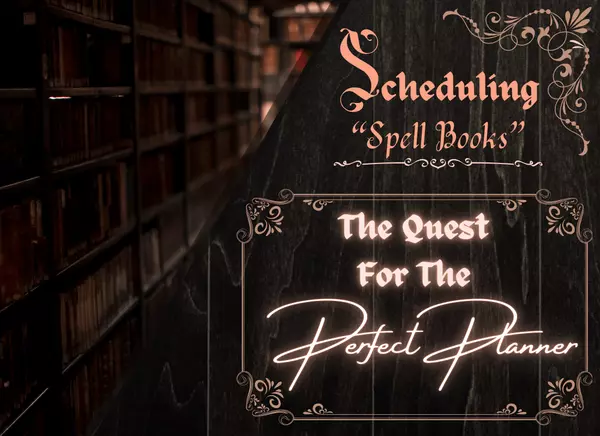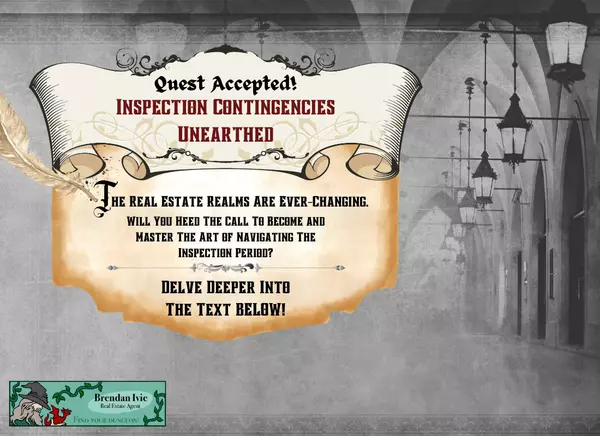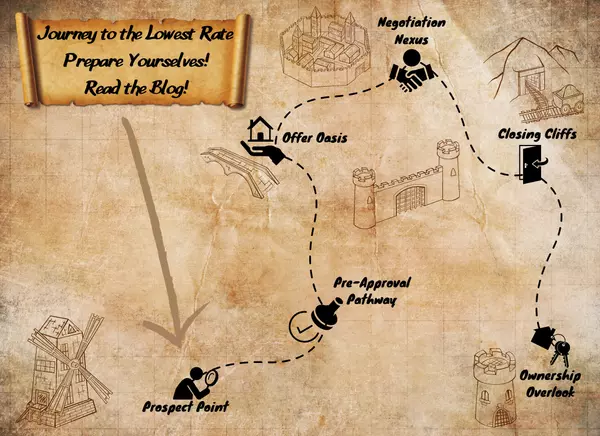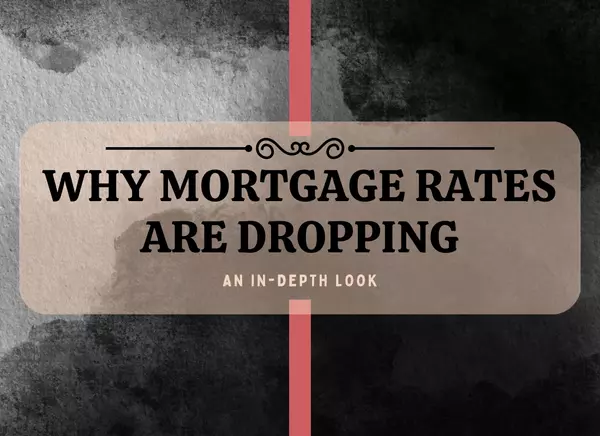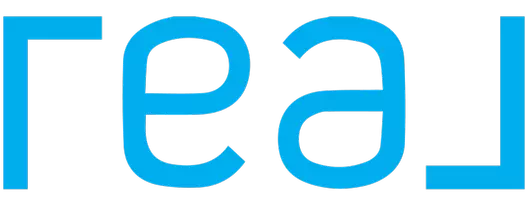Scheduling Spellbooks: A Quest for the Perfect Planner
Scheduling Spellbooks: A Quest for the Perfect Planner
In the fast-paced world of daily commitments, finding the right “spellbook” for your schedule can feel like discovering a hidden artifact in a roleplaying campaign. Whether you’re juggling countless client showings as a real estate professional or balancing personal errands, an appointment book gives you the power to command your time. Like a magic scroll that grants insight into the future, the right planner lets you anticipate and manage tasks effectively.This guide will help you navigate the realm of appointment books—from understanding their advantages to choosing the format that best suits your life. With the help of subtle TTRPG references, we’ll explore how to harness your scheduling prowess so you can tackle each day with confidence.
Why Appointment Books Matter
Appointment books (or planners) serve as trusty sidekicks in your quest for better time management. While many professionals rely on digital tools and scheduling apps, nothing quite compares to the satisfaction that comes from flipping through physical pages. An appointment book can be more than a simple time tracker; it can be a personal record of victories, challenges, and lessons learned along the way.
- Tangible Organization: Writing down tasks in a physical planner can feel like inscribing spells into a grimoire: it reinforces memory and anchors your attention to the present.
- Visual Clarity: With a quick glance, you can see your daily, weekly, or monthly schedule in neat layouts—similar to scanning the map of a dungeon before deciding your next move.
- Stress Relief: In real estate—and life in general—worries pile up if you don’t have a clear path forward. An appointment book keeps your days structured, helping ward off the chaos monster called Anxiety.
- Retention and Reflection: By reviewing past entries, you can track your progress, identify patterns in your schedule, and learn from your experiences. Allowing for the creation of brand new and potentially more effective organization methods.
A Brief Look at Digital Alternatives
It’s true—sometimes, the digital realm beckons like a shining portal. Scheduling apps on your phone or computer provide real-time updates, automated reminders, and color-coded tasks. For many modern professionals, these features are indispensable. But there’s also a certain magic to a physical planner that bits and bytes can’t replicate.
Pros of Digital Scheduling
- Easy sharing of calendars with team members (great for busy real estate agents).
- Saves time with instant reminders and notifications.
- Integration with communication platforms like email.
- Accessible on multiple devices.
Cons of Digital Scheduling
- Over-reliance on battery life and Wi-Fi availability.
- Potential distractions from social media, games, or the general digital noise.
- Less satisfaction compared to flipping real pages.
Ultimately, many people adopt a hybrid approach: a physical “spellbook” for their personal appointments and a digital app for instant collaboration or quick changes on the go. You don’t have to abandon one realm for the other.
Breaking Down Key Features of Appointment Books
If you decide to rely heavily on a physical planner, it’s important to know which features will suit your personal (or professional) campaign:
Format and Layout
- Daily View: Ideal for short-term scheduling, where each hour is filled with tasks, showings, or appointments. This is perfect if your real estate business demands close attention to detail, from morning property tours to afternoon contract reviews.
- Weekly View: Provides a broader overview of battles (tasks) and quests (goals) across multiple days. You can quickly see if your Tuesday is overloaded or if your Thursday looks free for a side quest (i.e., personal errands).
- Monthly View: Offers a bird’s-eye perspective, especially useful for planning marketing campaigns, big closings, or any significant milestone well in advance.
Size and Portability
- Large Format: More writing space—handy if you’re in an office most of the time, or if you do a lot of brainstorming or note-taking. Picture it like a war table map spread out before you.
- Compact: Easier to carry from showings to coffee shops to your next D&D session. Great for those who need to keep their schedule on-hand at all times but hate lugging around heavy tomes.
Customizability and Extra Features
- Sections for Goals and To-Do Lists: Transform your appointment book into a multi-purpose artifact that tracks quests (tasks) and the steps to accomplish them.
- Habit Trackers: Keep tabs on daily rituals—like lead generation in your real estate practice or your personal quest to drink more water.
- Notes and Brainstorming Pages: Perfect for logging new ideas, potential marketing plans, or staying focused on how to level up your client relationships.
The Role of Appointment Books in Time Management
Time management is a skill that can feel like rolling initiative at the start of each day. You never know what obstacles might appear in your path, from sudden client calls to unexpected market shifts. An appointment book helps you remain the hero of your own story by keeping you prepared, organized, and focused on your objectives.
- Visual Allocation of Tasks: By mapping your daily or weekly schedule, you can quickly see where you have room for additional side quests (minor errands) or major missions (critical tasks).
- Prioritizing Commitments: You learn to identify which tasks are “boss fights” that need immediate attention and which are more routine encounters.
- Archival Reference: If you need to look back on how you handled a past transaction or remember important notes from a property tour, flipping through old entries is far easier in a planner than scanning your memory (or endless digital archives).
Selecting the Right Appointment Book
Choosing the right “spellbook” can be daunting, but these steps will guide you:
Assess Your Scheduling Needs
- How many daily appointments do you typically have?
- Do you prefer a detailed breakdown by the hour or a more flexible day-to-day overview?
- Consider your real estate tasks, family commitments, and personal appointments.
- How often do you find yourself with free time?
Determine Your Preferred Format
- Daily, weekly, or monthly—decide which layout best matches your lifestyle.
- For hyper-busy folks or real estate agents with back-to-back property showings, a daily breakdown might be best. If your schedule is moderate, a weekly or monthly view might suffice.
Evaluate Extra Features
- Does a habit tracker, notes section, or goal-setting area interest you?
- Do you have effective time allocation strategies that require an extra level of supervision or data entry?
- Are you comfortable carrying a heavier planner if it includes more features?
Consider Aesthetics and Durability
- A well-made appointment book can last you the entire year (or campaign). If you like the design and feel of it, you’ll be more inclined to use it.
- Spiral binding vs. hardcover, basic black vs. colorful designs—these choices can affect how you feel about opening and updating it each day.
Balance Cost with Value
- Some high-end planners come with premium paper, elaborate layouts, and even coaching prompts. Others are bare-bones but get the job done.
- Think about how much you’re willing to invest in a tool you’ll (ideally) use daily.
Q&A: Exploring the Depths of Planner Knowledge
Before we conclude, let’s address some common questions adventurers face when seeking the ideal appointment book:
Q1: Should I use a digital tool and a paper planner simultaneously?
A: Absolutely. Many people find the hybrid approach works best—digital tools for quick changes and shared calendars, plus a physical planner for detailed notes and personal reflection.
Q2: Is there a best format—daily, weekly, or monthly?
A: There’s no one-size-fits-all. If your days are packed and you need granular tracking, go daily. If you prefer broad overviews and fewer details, weekly or monthly layouts might be more your style.
Q3: How do I stick to using my appointment book regularly?
A: Make it a ritual: set aside time each morning (or evening) to plan your tasks or update your progress. Treat it like preparing spell components—necessary before you can cast your daily scheduling “magic.”
Q4: Are there any downsides to choosing a bigger planner?
A: Larger planners can be bulky, which may be less convenient if you’re frequently on the go. On the flip side, they often have more room for notes, sketches, or expanded time slots.
Q5: Can I use my planner to organize real estate leads, showings, or contracts?
A: Definitely. In fact, many successful agents (including me) rely on planners to stay on top of property tours, client follow-ups, and contract deadlines. Some planners even have sections specifically designed for goal tracking, client management, and assigning tasks to team members.
Conclusion: From Chaos to Clarity
Choosing the right appointment book is like selecting the perfect piece of gear before entering a dungeon. If you pick a scheduling tool that aligns with your daily life—be it a daily, weekly, or monthly layout—you’ll be better equipped to handle surprises. From forging your personal time-management style to balancing real estate responsibilities, having a planner that suits your goals is invaluable.An appointment book shouldn’t be an afterthought. It can serve as a reliable ally, helping you stay vigilant against missed appointments and last-minute scrambles. With the right “spellbook” by your side, you’ll transform daily chaos into organized progress.
Stay Connected On Your Home Journey With Me!
Although I spend my days helping clients find properties they’ll love here in Texas, I also understand how vital time management is in every realm. After all, real estate isn’t the only quest in life—you’ve got personal events, ongoing projects, and side quests to tackle.
- Thinking of buying or selling? I can help you plan everything, from scheduling home showings to mapping out your closing dates.
- Have more questions? Whether it’s about a property search, scheduling tips, or about choosing the right appointment book, feel free to reach out!
- Looking to upgrade your personal scheduling approach? I can share which planner book, tools, or digital platforms my colleagues and I find most effective.
- Seeking Additional Knowledge? Feel free to explore my website to read even more real estate blog posts and keep up to date with the latest real estate trends!
- Need Daily Updates? Follow all of my socials to stay up to date with all of the latest real estate trends
Your real estate journey should be an exciting adventure, not a stress-inducing grind. Let’s team up and keep your schedule on track—together, we’ll navigate each day like seasoned adventurers.
References and Resources
- The Time Management Ninja: Should Your To-do List Be on Paper or in Your Phone?
- Provides articles, podcasts, and other resources to assist you in reclaiming your time and effectively budgeting your time!
- Wired: 11 Best Planners, Notebooks, and Accessories for Organizing Your Life
- Provides a list of 11 various appointment planning tools that have been categorized, so that you can find the planner that fits your style the best!
- Michael Hyatt & Company - Full Focus Planner: 4 Tips to Make a Journaling Habit Stick
- Provides insight into goal-based planning and maximizing daily productivity. Also provides various blogs and tools to assist you in forming habits and strategies to effectively make the most use out of your appointment book of choice!
- Todoist Blog: Inspiration
- A Blog/Newsletter that focuses on time management, digital task organization, and balancing multiple priorities effectively. Check it out to find inspiring strategies for how to effectively make the most out of your appointment book!
- Asana: The only work management platform built for scale
- A useful time management tool, that I actively utilize for appointment management as a real estate agent.
Note: This blog is intended for informational purposes and should not be considered professional advice. Always consult with experts for specific guidance.
Categories
Recent Posts
